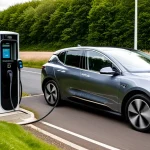How UK Technologies Are Transforming Transportation Infrastructure
UK technology is playing a pivotal role in reshaping transportation infrastructure across the nation. Through continuous innovation, the UK has introduced cutting-edge solutions that enhance the efficiency, safety, and sustainability of transport systems. These advancements span vital sectors such as roads, rail networks, and public transit, signaling a comprehensive transformation.
One major impact of UK technology on transportation infrastructure is improved efficiency. Smart systems optimize traffic flow and reduce delays, allowing vehicles to move more smoothly in both urban and rural areas. This results in reduced congestion and shorter travel times for commuters. Simultaneously, safety enhancements driven by innovative sensors and digital monitoring systems mitigate risks, lowering accident rates and protecting passengers and pedestrians alike.
Additional reading : How are UK tech startups revolutionizing the education sector?
Sustainability is another critical area where UK technology demonstrates strong influence. Integration of eco-friendly materials, renewable energy sources, and electrification within transportation infrastructure contributes to cutting carbon emissions. This fosters greener transport options and aligns with national environmental goals.
Roads are benefiting from smart upgrades such as intelligent traffic lights and real-time monitoring tools. Meanwhile, the UK’s rail network is seeing significant modernization efforts — including high-speed trains, electrification projects, and digital signalling technologies — that boost capacity and reliability. Public transit systems have embraced innovations like smart ticketing and real-time journey planning, enhancing user experience and operational effectiveness.
Have you seen this : What Are the Ethical Implications of AI in the UK Technology Sector?
In summary, UK technology stands as a cornerstone of a modern, efficient, and sustainable transport infrastructure ecosystem, delivering measurable improvements and setting the stage for future advancements.
Innovations in Smart Traffic Management
Smart traffic systems are at the forefront of UK technology transforming transportation infrastructure. Through traffic management technology, the UK has implemented adaptive traffic lights that respond to real-time conditions, improving flow and reducing idle times. For example, these systems analyze traffic volume and adjust signalling dynamically, which leads to notably smoother vehicle movement and fewer stoppages during peak hours.
One significant outcome of these congestion solutions is the reduction in commuter travel times. Studies reveal that adaptive traffic controls have shortened delays by up to 20% in urban centres where congestion traditionally peaks. These efficiencies directly decrease vehicle emissions, benefiting environmental sustainability goals. By cutting down on stop-and-go situations, vehicles burn less fuel, reducing pollution and supporting cleaner urban air.
Additionally, technologies like congestion charge zones utilize smart sensors coupled with data analytics to control and discourage excess traffic in sensitive areas. This blend of smart traffic systems and regulatory tools creates comprehensive congestion solutions that make a measurable impact. Together, these innovations demonstrate how UK transportation infrastructure leverages technology to manage traffic more effectively and sustainably.
The Role of UK Electric and Autonomous Vehicles
UK technology is at the forefront of electric vehicles (EVs) and autonomous vehicles (AVs) development, driving a new era of sustainable transport. UK companies and research institutions are pivotal players in advancing vehicle innovation UK, combining cutting-edge engineering with environmental goals. These efforts not only enhance performance and safety but also contribute to significant emissions reductions in transportation infrastructure.
A key focus lies in expanding the charging network across the UK, ensuring that infrastructure supports widespread EV adoption. The government and industry have collaborated to install rapid charging stations strategically, facilitating longer journeys and reducing range anxiety among drivers. Furthermore, regulatory frameworks have evolved to support AV testing and commercialization, reflecting a robust commitment to innovation.
Economic benefits emerge from this shift, including job creation in high-tech sectors and increased competitiveness in the global vehicle market. Public adoption trends show a growing acceptance of both EVs and AVs, fueled by incentives and awareness campaigns. As these technologies mature, their impact on reducing congestion, lowering pollution, and improving safety within UK transportation infrastructure continues to grow, underscoring the transformative potential of vehicle innovation UK.
Rail and Public Transport Technological Advances
Innovations in rail innovation UK and public transport are crucial pillars of the country’s evolving transportation infrastructure. High-speed rail projects, such as the HS2 initiative, exemplify how UK technology is boosting capacity and reducing travel times between major cities. This railway expansion is paired with electrification efforts, which replace diesel trains with electric ones, cutting emissions and improving efficiency. Alongside these, digital signalling technologies enhance safety by allowing real-time monitoring and control, drastically lowering risks of accidents and delays.
Public transit has similarly benefited from technological modernization. The widespread adoption of smart ticketing systems, which allow passengers to use contactless payments or mobile apps, simplifies journeys and reduces queues. Real-time journey planning apps provide commuters with up-to-the-minute information on schedules and disruptions, improving user experience and operational efficiency. These technologies foster a more connected and responsive transport network.
Together, these advancements demonstrate the multi-layered impact of UK technology on public transport systems—enhancing speed, safety, convenience, and environmental performance to meet modern demands.










